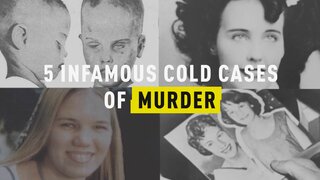Create a free profile to get unlimited access to exclusive videos, breaking news, sweepstakes, and more!
Key Aspects Of The Michael Peterson Case Not Included In Netflix’s 'The Staircase'
Kathleen Peterson had a life insurance policy for $1.4 million. Michael Peterson was the beneficiary.
Netflix’s popular docu-series “The Staircase” gives a compelling look at Michael Peterson’s 2003 trial for the murder of his wife Kathleen, who was found dead at the bottom of their staircase in their Durham, North Carolina home on December 9, 2001.
Peterson was convicted of first-degree murder in connection with her death and spent nearly a decade behind bars. He was granted a new trial in 2011 after a judge determined that a key prosecution witness lied on the stand during the original trial. But, in February 2017, just months before the scheduled retrial, Peterson submitted an Alford plea to the reduced charge of manslaughter. He was sentenced to time already served and it was decided he would never face another day in court, or jail, for his wife's death.
“The Staircase” chronicled the drama in and out of the courtroom and some viewers think episodes appear to leave out details that would do more to condemn Peterson. Here are a few essential elements of the case that the film omitted:
Kathleen had a life insurance policy for $1.4 million. Michael was the beneficiary.
In the film, prosecutors are shown arguing that motive for the murder was Michael Peterson's "hidden" sex life with men and Kathleen's anger about finding out — Peterson maintained Kathleen knew about it the whole time. But the series leaves out one major possible motivation: that Kathleen had a life insurance policy for $1.4 million. Kathleen changed her beneficiary from her first husband to Michael after they married in 1997, according to WRAL in Raleigh. In the end, the money didn’t go to Michael but to Kathleen’s biological daughter and Kathleen’s first husband.
Michael inherited and spent Kathleen’s death benefits.
Nortel Networks, where Kathleen worked as a vice president paid Michael $384,000 in death benefits, a sum which included deferred compensation, pension plan death benefits and retirement benefits, according to The Associated Press. Michael spent that money on his defense team, according to WRAL.
Michael was broke.
The author was $1.408 million in debt by 2003, according to Court TV. During his 2003 trial, prosecutors pointed to money problems as the motive in Kathleen’s death and stated in court that the couple was in the hole. Prosecutors claimed the couple had $143,000 in credit card debt, according to The Associated Press. As an attempt to get out of debt, the couple had been selling some of their liquid assets. There was also fear that Kathleen would be laid off from her job at Nortel, SPIN reported.
"Kathleen's death, accidental death, would have then allowed him to continue to live the affluent, privileged life to which he had been accustomed, even though he had no job," District Attorney Jim Harden said during the trial.
Michael had an affair with one of the filmmakers.
The film’s editor Sophie Brunet reportedly fell in love with Michael Peterson not long after he was accused of murdering his wife, and they apparently had an affair which lasted more a decade, according to the film’s director. "The Staircase" Director Jean-Xavier de Lestrade confirmed their relationship in May, stating that Brunet fell in love with Peterson while as they worked together on the film.
"This is one of the incredible things that happened during those 15 years. Life is really full of surprises,” De Lestrade told L'Express, a French newsweekly. “They had a real story, which lasted until May 2017. But she never let her own feelings affect the course of editing."
That’s debateable.
A bloody footprint matching Michael’s shoe was found on Kathleen.
The film did not explain the bloody footprint found on the back side of Kathleen’s sweatpants, which was facing the floor when police arrived, according to NBC News. No explanation was offered of how that could have happened.
Michael was accused of trying to stage the crime scene.
A bottle of wine and two glasses neatly were on the kitchen counter when police arrived. However, Kathleen’s fingerprints weren’t on either of the glasses. The prosecution claimed that the wine and glasses were an attempt by Michael to stage that Kathleen had too much to drink before she fell down the stairs. She had something to drink but the medical examiner concluded that her blood alcohol content was low enough to pass a breathalyzer test, NBC News reported.
There were red neurons found in Kathleen’s brain.
Aphrodite Jones’ 2004 true crime book on the case, “A Perfect Husband,” reveals that red neurons were found in Kathleen’s brain. Red neurons indicate that oxygen had failed to reach brain tissues. According to the book, Kathleen had to have been lying dead for at least two hours for the red neurons to develop. Neuropathologist Dr. Thomas Bouldin testified for the prosecution that she was dead for hours. That contradicts the amount of time that Michael claims he was outside alone. The film only focused on the experts called on by the prosecution which claimed it had been hours based on how dry the blood was.
Michael deleted hundreds of computer files the week of Kathleen’s death.
Police seized Michael’s computer and determined that he had deleted 216 files the day before Kathleen's death and 352 files two days after, according to Jones’ book. The state hired an expert to recover some of the deleted files. That expert said he found deleted emails that details Michael’s financial issues. In one email, Michael said that both of his sons were living in debt and struggling. In another, he asked a relative for $5,000 for one of his adopted daughter's college tuitions. In another, he asked his ex-wife to take out a $30,000 home equity loan to help their son's debt issues.
[Photos: Getty Images]



























